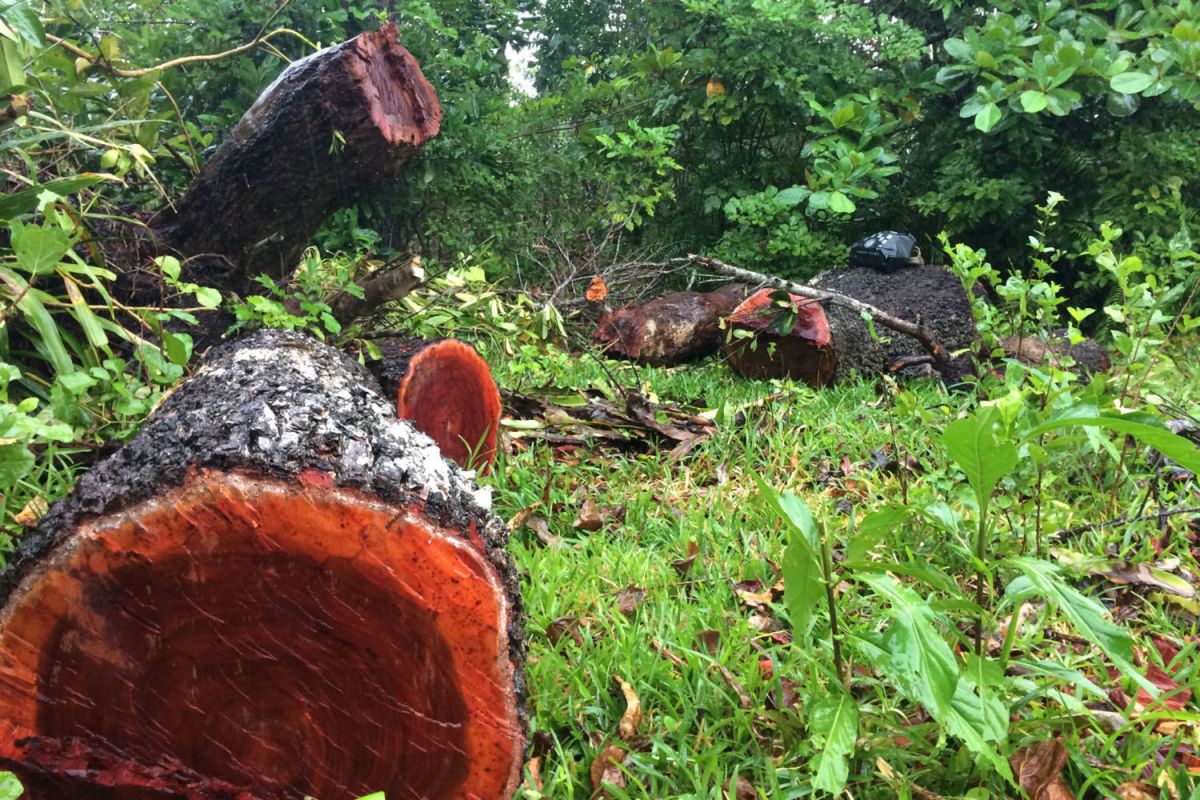Global Courant 2023-04-21 03:50:20
African countries are estimated to lose 17 billion dollars every year to illegal logging. There is worldwide demand for high-quality woods.
Illegal logging is most common in the tropical rainforests of the continent. Foreign demand for rare hardwood from these forests has increased dramatically increased. An important driver is the Chinese demand for teak, redwood and mahogany. According to the United Nations Office on Drugs and Crime, Africa’s share of rosewood exports to China rose from 40% in 2008 to 90% in 2018.
2020 UNODC World Wildlife Crime Report
Illegal logging has a negative effect environmental effects that weaken human security. Deforestation in the second largest carbon sink in the world, the Congo Basinis an urgent example.
In addition to environmental degradation, the timber trade also has implications for national security. Drawing of our recent reportdrawing on our recent research and programmatic work at the Africa Center for Strategic Studies, we analyzed three ways in which illegal logging affects national security and what that means for current countermeasures.
First, illegal logging increases the threat posed by organized crime groups and violent extremist organisations. Second, illegal logging increases governance problems. This is because it allows for collusion between senior corrupt officials and criminal networks. Third, such collusion weakens the accountable management of natural resources in African countries. That is an important ingredient of peace and security and a source of resilience against national security challenges.
Two things are needed to combat illegal logging. One is dismantling the high-level criminal networks that power it. The other is stopping the government-embedded actors that facilitate it. Oversight and accountability are therefore essential. Civil society can play a role here.
The domino effects
Illegal logging happens via small-scale and commercial activities.
The ENACT Organized Crime Index is a well-known measuring instrument for assessing crime and resilience. It identifies and tracks criminal networks, state-embedded actors, foreign actors and “mafia” style armed groups known locally and controlling the territory.
The work of these groups has several knock-on effects.
Violent extremism and insurgency: The illegal timber trade fuels conflict and instability by providing resources for violent actors. For example, smuggling networks in Tanzania and the Democratic Republic of Congo are linked to Ahlu-Sunnah Wa-Jama and related militant groups in Mozambique made an estimate 2 million dollars per month from illegal logging in 2019.
In Senegal, the Movement of Democratic Forces of Casamance recently financed his rebellion through the illegal logging of rosewood. Warlords and militias in Liberia, the Central African Republic and the DRC have also used trade for financing.
Collusion and Corruption: Illegal logging often relies on government corruption and elite collusion with criminal networks. This undermines the rule of law and responsible governance.
Criminal networks are often aided by high-level state actors. For personal gain, they help criminals buy commercial concessions, obtain forged permits or falsely declare the type of timber being exported to wash them.
Elites colluding in this trade then use the international financial system to deposit the profits into private bank accounts. This adds to the estimated $88 billion in illicit money flows that leave Africa every year.
In Equatorial Guinea, Teodoro Nguema Obiang Mangue, son of President Obiang, benefited enormously of the transport and export of rare hardwoods. As minister of agriculture and forestry, he sold some state forests to private companies and used a shell company affiliated with the ministry to charge fees for processing, loading and transporting timber.
In 2021, the Zambian Anti-Corruption Commission confiscated 47 trucks illegally loaded with rosewood on their way to Namibia and Zimbabwe. The operation was reportedly facilitated by certain ministers and relatives of former Zambian President Edgar Lungu.
In 2019, Gabon’s Vice President and Minister of Forestry were part of a rosewood trade scandal. Since then, the government has been pursuing it increase transparency in the management of natural resources.
Solutions
Many African states have tried to halt logging – with limited success.
Guinea-Bissauthe DRC And Kenya have controversially ended the moratoria on logging. Mozambique does not have the capacity to enforce existing bans.
It’s easy to get around a moratorium if the state’s security and justice systems don’t operate transparently. A moratorium can even harden criminal networks without the corruption And livelihood challenges that facilitate illegal logging.
Several other forest monitoring approaches are being trialled on a smaller scale. These include usage satellites or genetic markers of protected trees.
The Kenyan Forestry Service is pioneer an app for officers to use satellite data in community initiatives.
Regional reactions have potential. In 2008, the Central African Forests Commission issued a agreement involving eight countries’ ministries of environment and forestry to help coordinate law enforcement.
The agreement emphasizes cross-border and interdepartmental coordination between security, justice and forestry officials. These harmonized forest management practices are also showing promise in southern Africa.
Agreements like these are valuable, but politically difficult to implement.
An example is the Convention on International Trade in Endangered Species of Wild Fauna and Flora. It is a binding agreement on international trade in certain timber products. But it depends on states adopting relevant national laws and policies.
Non-binding instruments such as the Zanzibar Declaration on the illegal trade in timber and forest products and the Accra statement on combating illicit trade in rosewood, timber and forest products also indicate that countries intend to fulfill their commitments.
But that requires credible enforcement mechanisms.
Bridging gaps
Stronger oversight of actors involved in natural resource management could help. Civil society has a role to play here.
In Gabon, for example, civil society has put pressure on the government greater transparency in logging contracts. In Cameroon, it has independent monitoring of forest regulations.
In Ghana, lawsuits aimed at preserving forests have been filed. And independent journalism has pressured officials to clamp down on the illegal movement of rosewood.
Civil society is also building economic resilience against illegal logging. Civil society has improved in Tanzania and the DRC control by the community on land management and ensured legal livelihoods in the logging industry more feasible.
Uganda afforestation projects have also helped.
Key learning points
External supervision is an essential part of countering illegal logging. It works best where civil society is strong.
Internal supervision is also important. Inspectors General, specialized prosecutors and independent anti-corruption agencies can help expose key figures organizing illegal operations.
International cooperation between security, justice and forestry officials should guide oversight so that these actors can share information and facilitate the arrest, investigation and prosecution of those engaged in illegal logging.
Regional and international agreements are working in the right direction. What they need is better execution.
Catherine Lena Kelly is deputy dean and associate professor at the National Defense University. Charles Pelgram is a senior academic associate at the Africa Center for Strategic Studies.
Caden Browne, a political science PhD student at Boston University, contributed to this report while interning at the Africa Center for Strategic Studies, National Defense University.
This article has been republished from The conversation under a Creative Commons license. Read the original article.
Similar:
Loading…








